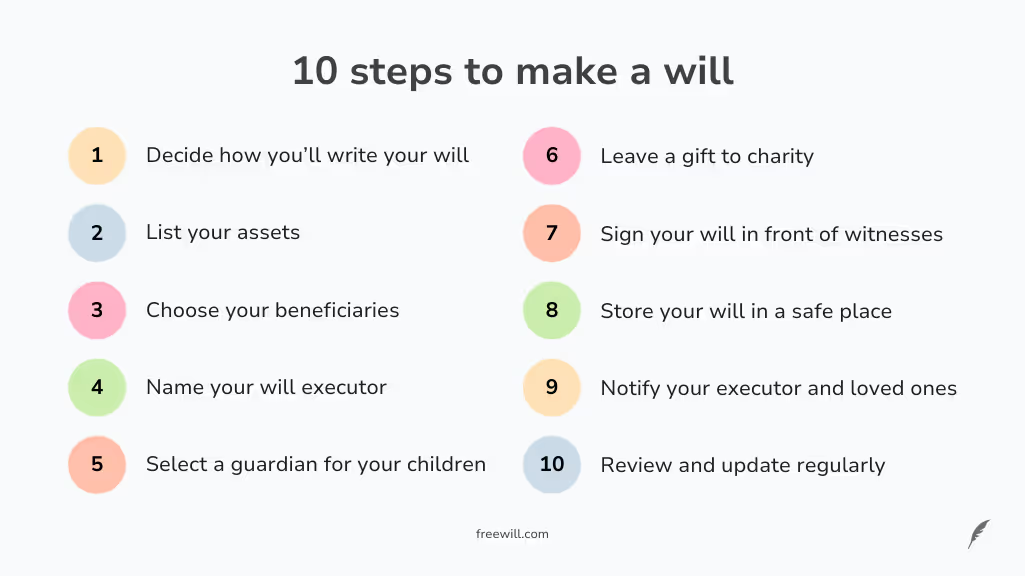Making a will isn’t as expensive or time-consuming as most people think. In fact, you can even write your own will without the help of an attorney. And your loved ones are counting on you to make a will, even if they don’t know it. Making a will lets you take control of your legacy. It also provides protection and peace of mind for the people you care about the most. So, how do you create your will?
How to make a will in 10 easy steps

1. Decide how you'll write your will.
There are several different ways you can create a will, depending on your needs.
- Use an online will maker. With today's technology, it's easier than ever to create a valid last will and testament using online tools. There are completely free options — like FreeWill — or other providers who charge a fee. Using FreeWill makes it so easy that you don't even need to read the rest of this article. Our online will-making software will walk you through everything, step-by-step.
- Hire an estate planning lawyer. If you have a complicated estate — for example, if you have a lot of assets or own a business — you may benefit from hiring a lawyer to help you make your will.
- Purchase a will kit or template. While this may seem like the cheapest option, will kits and templates can create more issues than they solve. It’s easy to make a mistake when making a handwritten will, and they can be difficult to prove in court. Using a free online platform, like FreeWill, makes creating your will simple, straightforward, and legally sound, without breaking the bank.
2. List your assets in your will.
As you create your own will, make a list of all the items and accounts you own. These are your assets. In the next step you’ll decide who should inherit these assets when you’re gone. This list should include:
- Physical property, like your home, vehicles, and other real estate you own
- Financial assets, like your bank accounts
- Pets: Most people think of their pets as part of their family, but they’re considered property under the law. Be sure to name a trusted caretaker for your pet in your will.
- Family heirlooms or personal items: If you have valuable or sentimental items that are important to you — your grandmother’s old tea set, vintage jewelry, or anything else — you can designate them to specific people in your will. That way, your loved ones know exactly what’s important to you and who should inherit it.
Need more help? Here's a complete list of assets you should include in your will.
What about retirement accounts and life insurance policies?
These are important financial assets, but they’re also unique. They can skip the legal process after you pass away and go directly to your beneficiary. Instead of listing them in your will, you should name beneficiaries for them directly.
To do this, you need to reach out to the institution that manages the asset (for example, the insurance provider that manages your life insurance policy). You can usually do this online. Learn more about beneficiary designations.
3. Decide who should receive your assets.
Once you’ve created a list of your assets, it’s time to choose who should receive each of them after you pass. These recipients are called beneficiaries. Your beneficiaries can be virtually anyone: your spouse, children, family members, friends, and even charities that matter to you.
In your will, you should explicitly state who you want to receive each of your assets. Be specific! Include full names and the person’s relationship to you. Some people even ask their loved ones for input while making their wills, especially for items that can’t be split (like family heirlooms or property). Telling your loved ones exactly what they can expect from your will before you pass away can prevent confusion or surprise down the road.
Considerations: Property deeds and titles
The beneficiaries you name in your will can’t override what’s on a deed or title. For example, if both you and your spouse’s name are on your house deed, the house would belong to your spouse once you pass, even if you try to give it to someone else in your will.
4. Choose your will executor.
The executor of your will is the person who will read your will and carry out your final wishes. They’ll distribute property to your beneficiaries, pay your debts with money from your estate, and more.
To nominate an executor, simply state their name in your will. You should choose someone reliable, organized, and trustworthy, because it can be a complicated job with many responsibilities. Many people nominate their spouse, adult child, or a trusted friend to fill the role — just keep in mind this may add an extra burden while they are grieving. You could also choose an accountant or attorney, and pay them a fee that comes directly out of your estate.
Acting as a will executor is a big duty. Once you decide on an executor, it’s important to let them know, so you can be sure they’re willing to take on the task. You can also name a backup executor in case your primary is unable or unwilling to fulfill the role when the time comes.
5. Choose guardians for your minor children.

If you have children who are under 18, you should choose a guardian for them in your will. When you pass, your child’s other parent will usually get sole legal guardianship. But if you both pass at the same time, your chosen guardian will step in to care for your kids.
Being a guardian is a huge undertaking, so have a discussion with your nominated guardian and make sure they’re willing. This should be someone you trust to raise your children the way you’d want them raised. Just like with an executor, you can name a backup guardian in case your first is unable to fulfill their role. Some people set aside money for their appointed guardians, to help offset the financial cost of adding more children to their household.
Appointing a guardian for your underage children may be one of the most important things you do in your will. If you die without nominating a guardian, and your child’s other parent can’t care for them, the court will choose a guardian for you. If there are no volunteers, your child may become a ward of the state and enter the foster care system.
6. Leave a gift to charity.
This step is optional, but you can include nonprofit organizations as beneficiaries in your will. A gift to charity in your will is called a bequest. You can leave many kinds of assets to charity, including cash, real estate, a portion of your investment earnings, or your life insurance policy payout.
To leave a gift for a nonprofit in your will, you should include the organization’s full name, street address, and Employer Identification Number (EIN).
Want to learn more? Check out our complete guide to leaving a gift for charity in your will. In FreeWill’s online will maker, there’s an optional section where you can easily leave a gift to charity.
7. Sign your will in front of witnesses to make it legally valid.
You're almost done! Once you finish making your will, you must sign it in your own handwriting to make it legally valid. Most states require that you sign your will in front of two witnesses, who will also sign your will.
There are some requirements for witnesses: They should be legal adults (18 in most states) and of sound mind. Your witnesses shouldn’t be anyone listed in your will (like your executor or guardian) or anyone who will inherit something from you (like your children). But they could be roommates, neighbors, or other friends.
If you make your will with FreeWill, we provide instructions for how to make your will legally valid specific to the state where you live.
8. Store your will in a safe place.
Once you and your witnesses have signed your will, you should store it in a safe place. This could be in a fireproof safe in your home, a specific drawer in your desk, or at a trusted attorney’s office. It’s also become increasingly popular to save your estate planning documents in a digital vault — but even if you go the digital route, you should always have an up-to-date paper copy of your will.
You should store other important estate planning documents in the same place as your will. This includes property titles and deeds, life insurance policy information, funeral instructions, and online password information. This makes it easy for your will executor to find all your important documents after you pass.
9. Tell your executor and loved ones where your will documents are and how to access them.
Your will is only helpful if your loved ones can find it. Once you store all your estate planning documents, let your will executor and family know exactly where they are and how to access them.
10. Review and update your will regularly.
Generally, you should update your will every three to five years, or whenever you have a qualifying life event. This includes:
- Getting married or divorced
- Having children or grandchildren
- Buying a house
- Moving states (since will requirements vary from state to state)
- If one of your beneficiaries or executors passes away
It’s a good idea to set a reminder to review your will every year, just to make sure nothing has changed. You could add an event to your digital calendar so you don’t forget, or batch it with another administrative task. For example, many people choose to review their wills during tax season, because their property and financial assets are already top-of-mind.
If you use FreeWill to make your will, you can log in to your account at any time to make unlimited changes to your documents — it's always free, forever.
Frequently asked questions
When should you first make a will?
Anyone 18 and older should have a will, even if you feel like you don’t have a lot of property or money. A will is about so much more than what you own — it’s a tool you can use to take care of your kids, pets, and the people you love.
No matter how much stuff you own, your estate has to go through a legal process called probate after you pass away. Having a will is like handing a blueprint of your wishes to your loved ones from the beyond. It makes the probate process faster, easier, and often cheaper for the people you care about the most.
Do I need to notarize a will?
No, you don’t need to notarize your will for it to be legal. Currently, Louisiana is the only state that requires wills be notarized. If you live in any other state, you can simply sign your will in front of witnesses to make your will valid.
While it’s not required, you do have the option to use a notary to make a self-proving affidavit. This is a notarized document that “proves” your will and can help speed up the process of distributing your estate after you pass away. Self-proving affidavits are optional and aren’t recognized in every state.
What is the difference between a will and a trust?
Trusts and wills perform a similar function: you use them to distribute your assets after you pass away. Legally, they do this in different ways. Wills are legal documents you use to state your intentions for your property. Trusts are legal entities that own the property you transfer into them.
We break down the difference between trusts and wills in detail on our blog.
How much does it cost to write a will?
The cost of your will depends on which option you use to create it. Hiring an estate attorney to create your will would likely cost several hundred dollars. Alternatively, you could make your will online for a fraction of the cost (or even for free).
Make your will for free with FreeWill
Creating a will is a gift: the gift of peace of mind for yourself, and the gift of protection and clarity for the people you love. With FreeWill, you can securely create your will for free online.
Make your free estate plan today

Make your free advance healthcare directive

Make your free durable power of attorney

Make a stock donation today

Make your free revocable living trust










